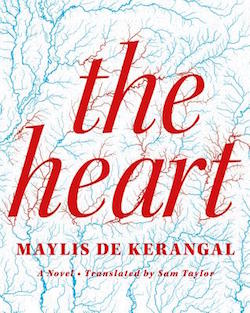Lunch Date: Taking The Heart to Renton

Who’s your date today? The Heart, a novel by Maylis de Kerangal and translated by Sam Taylor.
Where’d you go? I walked to Renton this weekend. I was very hungry when I got there, and I know very little about Renton, so I asked Twitter where I should go. Josh Cohen recommended Naan-N-Curry a Pakistani/Indian place that's been in downtown Renton for over a decade.
What’d you eat? I had the butter chicken ($13.99) and the garlic naan ($2.99).
How was the food? Granted, I had just walked 16 miles and so I was pretty hungry, but I thought it was really good; maybe the best butter chicken I've ever had in a restaurant. The naan could have used a little more garlic, but the chicken was thick and creamy and packed with spice. It would have been a better family-style dining experience, but as it was, I sopped up the last of the sauce with the last piece of naan, and the four-star heat was just about perfect.
What does your date say about itself? It's a contemporary French novel by an award-winning young novelist. From the publisher’s promotional copy:
Just before dawn on a Sunday morning, three teenage boys go surfing. Returning home, exhausted, the driver lets the car drift off the road into a tree. Two of the boys are wearing seat belts; one is sent through the windshield. He is declared brain-dead shortly after arriving at the hospital. His heart is still beating.
The Heart takes place over the twenty-four hours surrounding a fatal accident and a resulting heart transplant as life is taken from a young man and given to a woman close to death. In gorgeous, ruminative prose it examines the deepest feelings of everyone involved — grieving parents, hardworking doctors and nurses — as they navigate decisions of life and death. As stylistically audacious as it is emotionally explosive, Maylis de Kerangal's The Heart has mesmerized readers in France, where it has been hailed as the breakthrough work of a new literary star.
Is there a representative quote?
Pierre Révol went on duty that morning at eight. As the night sky lightened to a pale dove gray above him, far from the grandiloquent choreographies of clouds that had made the estuary's picturesque reputation, he slid his magnetic card into the reader at the entrance of the parking lot and drove slowly across the hospital grounds, snaking between buildings that connected to each other according to a complex plan, and parked his car — a gunmetal-blue Laguna, quite old but still comfortable, leather interior and good sound system: the model preferred by taxi companies, he thinks, smiling — in his reserved spot, nose first. He entere the hospital, walking quickly across the vast glass-walled lobby toward the North Hall, where he reached the Intensive Care Unit.
Will you two end up in bed together? Yes. That above passage really tells you all you need to know about The Heart: it's a novel about a heart transplant that has all the detail of finely wrought reportage. De Kerangal has clearly done her research into what goes into organ donation, and the book feels more solid and particular than most novels because of it; it only takes up a very short amount of time, but somehow the reader feels as though they understand where everyone is at any second, and why they're doing what they're doing. If it were non-fiction, it would be incredibly compelling stuff. As fiction, I could see certain readers losing patience with The Heart, but those who like to see reality reflected perfectly in fiction — those who care if a character parks nose-in, or back-in — will fall in love with this book.